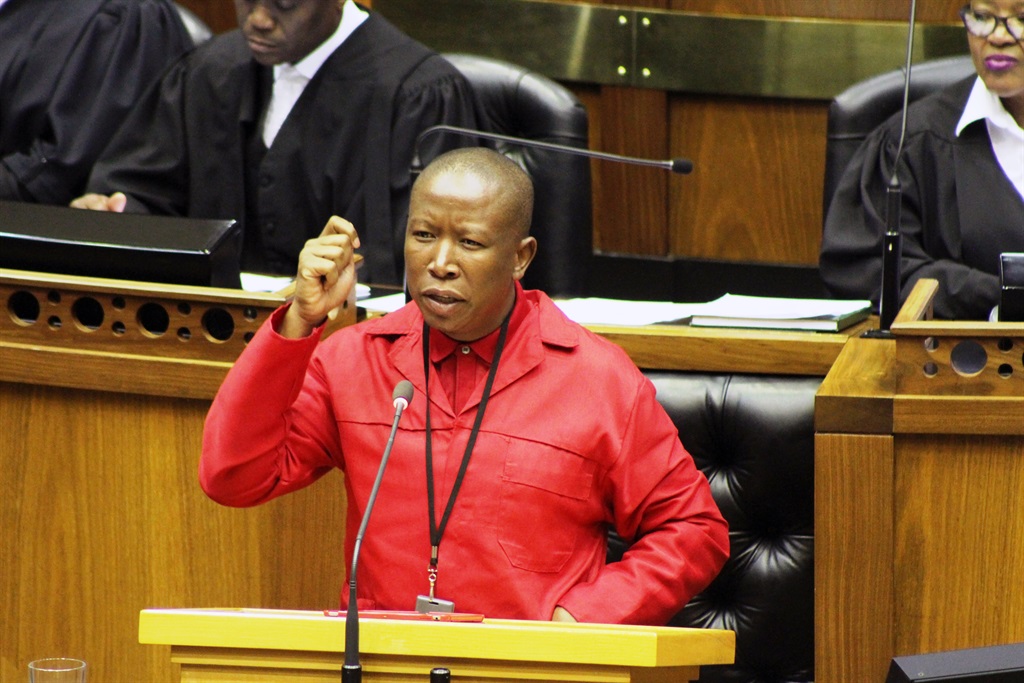Julius Malema loves the media. And he has loved the media ever since he became the leader of the ANC Youth League in 2008.
In the South African political landscape there is no better quote than one from Malema. Whether he was holding court at Luthuli House in the heady days of the ANCYL, or stomping out of the National Assembly in his red worker's overalls as EFF leader, Malema has been top of the pops for news editors across the country for a decade.
He has brought millions of consumers to news platforms, and they in turn have given him almost wall-to-wall coverage. But the worm has turned, and after calling out individual journalists, threatening that they must be "dealt with decisively" by EFF members and "banning" the Sunday Times from party events last week, some of the country's editors have now had enough.
The South African National Editor's Forum (Sanef), a body that represents editors and journalists, asked for a meeting with the EFF to discuss the party's stance, but the request was declined. Malema also rebuffed attempts by Sanef chairperson (and editor-in-chief of EWN) Mahlatse Mahlase to open a dialogue, saying that "maybe" the media should in future not be invited to party events.
Malema and the EFF accuse many in the media of being part of a so-called "Ramaphosa Defence Force" and refusing to scrutinise figures like Pravin Gordhan to the same degree as was done with others (like former president Jacob Zuma). And he's opted to demonise those who write critically of him and his party, with the support of a whole cohort of Twitter trolls.
Ranjeni Munusamy, an associate editor at Tiso Blackstar, says she believes the EFF and the media's relationship changed when the party launched its attack on National Treasury and specifically Ismail Momoniat, a deputy director, earlier this year. Floyd Shivambu, EFF deputy leader and Malema's long-time wingman, accused Momoniat of being part of "a cabal" that disrespected blacks and ran Treasury. The media reported critically on Shivambu's racially charged comments and they did not appreciate it, Munusamy says.
But recent revelations about Shivambu's brother, Brian, having received millions of rands of looted money from VBS Mutual Bank and the Daily Maverick's Pauli van Wyk alleging that almost R2m flowed to Malema and the EFF have only served to heighten tensions.
Did we miss the signs?
Some critics – many part of the commentariat on Twitter – say the media is now merely receiving its comeuppance and that it (the media) is only now waking up to what many have been saying for years: that Malema isn't the cute, cuddly and harmless revolutionary he has sometimes been portrayed as. Think back to his foul-mouthed ejection of BBC journalist Jonah Fisher from Luthuli House in April 2010, calling him a "bloody agent" and a "bastard", aggressively adding that he shouldn't show "these white tendencies, not here". Or recall Shivambu labelling political journalist Carien du Plessis a "white bitch" and "stupid", for which the Equality Court ordered him to apologise.
The signs were there, they say.
Ferial Haffajee, who was editor-in-chief at City Press when Malema was ANCYL president and when he established the EFF, says most coverage of him in the early years was "admiring".
"We were the first title that really started to cover him in minute detail and saw his rise, the emergence of his corporatist bent and his tendency and desire to accumulate. And when Piet Rampedi exposed his dealings in Limpopo he was affronted. He was important to City Press and in turn City Press was important to him," Haffajee, now an associate editor at both Fin24 and Daily Maverick, explains.
And Mpumelelo Mkhabela, editor of Sowetan in Malema's early years, says the broad coverage of Malema and his associates was justified.
"Malema was suspended from the ANC and eventually dismissed… he was mired in a high-profile battle with (then president) Jacob Zuma. And I remember the judgment by the ANC's appeals committee, chaired by (now president) Cyril Ramaphosa, being broadcast live on television. There was clear public interest in Malema and the media's coverage of him, by then positioned as almost independent of the ANC, was clearly justified."
Julius Malema (right) chats to ANCYL treasurer Pule Mabe during a media briefing at Luthuli House. (Felix Dlangamandla)
The roots of Malema’s political power and what led to the media attention he now gets “lies squarely in Zuma’s refusal to disavow his more incendiary statements back in 2009 and 2010”, political reporter and now SAFM presenter Stephen Grootes believes.
"I'll never forget how ANC spokesperson Zizi Kodwa at a press conference was unable to spin himself out of it after Malema said he is willing 'to kill for Zuma'. He couldn't explain it, but he couldn't condemn it.
"I also recall a group of journalists laying a complaint with Gwede Mantashe, ANC secretary general, about Malema's attacks on the media, but nothing came of it and no official ever spoke out against him. It's what helped him get his start," Grootes, who covered Malema for EWN as a political reporter, says.
“The political situation around Malema is also important. If Ramaphosa was ANC president between 2007 and 2012, I don't think Malema would not have gotten to where he is today.”
Both Grootes and Munusamy agree that Malema and the EFF changed the political debate in South Africa because it was formed shortly before the 2014 election.
The EFF wins support
Munusamy says she knew from the beginning that Malema and Shivambu were going to make an impact on the political environment. "I remember interviewing them after they formed the EFF, at the Michelangelo Hotel (in Sandton), and thinking they have clear ideas of what they wanted to achieve. They were not going to be a flash in the pan."
After Malema and the EFF were elected to Parliament there was an expectation that they would "grow up", Mkhabela says, and start to practice politics within the established rules of political engagement. Haffajee says the party also won support for the way in which it challenged Zuma "to pay back the money" and how they used the courts to ensure accountability.
At the time – between 2013 and 2016 – South Africans were numbed by allegations of grand corruption and Zuma's grip on the ANC and government. Grootes believes the EFF's full-frontal attacks on Zuma as opposed to the DA's "rule-based attempts" to fight him did win him support from sections of the media.
“Malema was able to rise partly because of the divisions between the factions in the ANC. We shouldn’t forget the media is made up of groups of different people in different organisations who will have diverse views on things.
"This is why media diversity is important. But it also means what we call 'the media' has no single view on Malema. At the time, some people in society believed opposing Zuma in any way was the most important thing.”
According to Munusamy the EFF's positioning was enabled by the fact that the ANC was on the decline and unable to account for or grasp the enormity of state capture abuse. The EFF was able to ensure some accountability and cast itself as the "antidote" to corruption.
Haffajee says Malema and the EFF became the public's "talisman" in the anti-corruption fight.
Malema addresses the National Assembly of Parliament. (Lindile Mbontsi)Malema 'dropped the costumes'
The DA's strategy was simply not forceful enough to capture popular imagination, Munusamy says. The country's largest opposition party just couldn't hit the spot with their anti-Zuma efforts. "The EFF were brash, they used hashtags to drive campaigns and it resonated with a tired public."
When he established the EFF, Malema seemingly "dropped the costumes" of expensive clothes and the good life and adopted the red overalls of the working class. This caused Haffajee to believe that a political realignment was taking place: "It felt like a real conversion by him."
"Our coverage then, to be honest, was quite admiring. He was openly challenging Zuma and it looked like he was leading a more ascetic life. But it all turned out to be a veneer. It was though reflective of the time and the admiration was for a political formation that, in 2016, turned out to be quite a significant political force and one that in some instances played the role of kingmaker," says Haffajee.
The former City Press editor says the Malema who her paper wrote about – faced with allegations of corruption in Limpopo, implicated in dodgy deals and insulting journalists – never really changed.
At Sowetan the EFF's arrival on the scene was welcomed. "Malema and the EFF were a phenomenon and for me political diversity in a developing constitutional democracy was a good thing, even though I personally disagreed with the party's ideology," says Mkhabela, now an academic at Unisa and a columnist for News24.
"And when they went to Parliament we did not expect them to challenge decorum and process to the degree that they did. But the politics of disruption has now become part of who they are and when you think back, there's a clear line from Malema's days as a disruptive young Cosas leader and who he is today."
Mkhabela says he cannot fault anyone who thought Malema's behaviour would change with time – especially after the EFF won more than a million votes in the 2014 election. "People thought they would grow, that after getting a degree, growing a little older and more mature and going to Parliament they would change. It's disappointing that it didn't happen."
Grootes says he isn't surprised that Malema and Shivambu haven't changed. "Shivambu, over all these years, has shown nothing but disdain for the media. He has been dismissive and hasn't shown one ounce of respect for our role."
Could the media have managed Malema differently?
Grootes says it is daft to suggest the EFF and its leader must be "censored" or that journalists must report selectively. But, he says, they can, and must, fact-check and call out politicians who lie.
Munusamy says she has learnt "the hard way" that Malema's past behaviour was always bound to manifest itself again, and that journalists should have expected it.
Mkhabela believes the media could take a leaf out of the Sowetan's coverage from the early years when the newspaper steered away from directly reporting Malema's inflammatory statements.
And Haffajee argues the media is not in opposition to the EFF and that the current tension should not be cast as "the media versus the EFF".
"The media" is not a monolithic entity and there are sharp differences between organisations and journalists. But it's clear that most members of the Fourth Estate are re-evaluating their approach to a party with 6% of popular support, but the lion's share of media coverage.




 Publications
Publications
 Partners
Partners

























